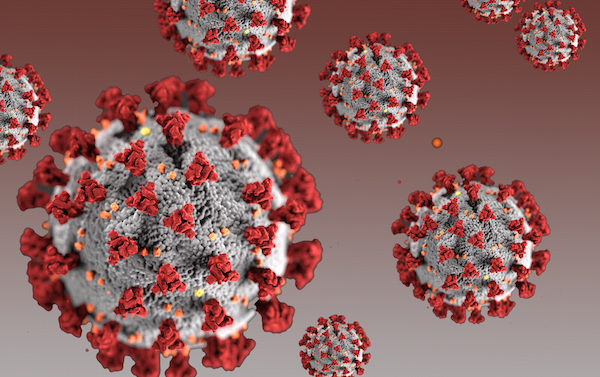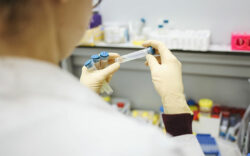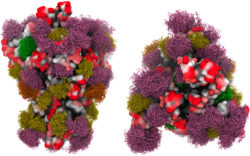The University of Georgia’s weekly update on COVID-19 testing showed a steady rate of positive cases compared to last week, with 66 positive cases for the week of Sept. 28-Oct. 4. Of particular significance, this week’s data showed a large number of staff members who tested positive, and participation in surveillance testing is down again for the second week in a row.
As reported through UGA’s DawgCheck system, positive cases included 52 students, 12 staff and two faculty members, with a positive rate of 1.17%. While that rate is below the 5% rate recommended by the World Health Organization to control the pandemic, UGA’s press release Wednesday again noted that there’s been a drop in the number of people seeking out testing at the surveillance site, with only 1,365 test administered last week. UGA has the capacity to test up to 500 people a day, Monday through Friday at Legion Field.
“While I am pleased that the number of positive test results remained flat this week, I am discouraged to see that participation in surveillance testing has further declined,” said Garth Russo, executive director of the University Health Center and chair of UGA’s Medical Oversight Task Force in a press release. “We are offering nasopharyngeal testing—one of the most reliable methods available—for free to our faculty, staff and students at Legion Field. A robust testing program for asymptomatic individuals is an essential component of our ongoing efforts to fight this disease, and we need significant and representative segments of our campus community to take part.”
Although the surveillance testing site shows a low positive rate, the University Health Center’s data, where many of the symptomatic cases are tested, showed that 117 tests were administered, with 11 positive and 106 negative, for a positive rate of 9.4%.
Last week, UGA confirmed to Flagpole that they have not yet utilized the 10,000 saliva tests they have in stock. Just this week, however, UGA began pop-up saliva testing once a week at different locations around campus, according to an email sent out to faculty and staff. The saliva tests that UGA has access to are PCR or viral tests and not rapid antigen tests, said Greg Trevor, interim senior executive director for marketing and communications at UGA last week. This is the first time that UGA has offered additional surveillance testing options on campus. The additional testing is being done in cooperation with the UGA College of Public Health and the AU/UGA Medical Partnership.
Two more dates are scheduled for this month at additional sites, including Oct. 15 from 9 a.m.-12 p.m. at George Hall on the Health Sciences Campus and Oct. 20 from 10 a.m.-2 p.m. at the Georgia Center/Mahler Hall Mobile Clinic. The pop-up testing locations offer free, walk-in asymptomatic testing for all UGA community members. Just bring an ID and avoid eating, drinking, smoking or chewing tobacco 30 minutes before the test.
County Data
As of Oct. 7, Athens-Clarke County data shows that there have been 5,249 positive cases reported, with 45 total deaths and 234 cumulative hospitalizations. This case count is an increase of 165 cases since Wednesday of last week, with one additional death.
On Monday, the Georgia Department of Public Health began releasing more data to the public, including more specific information on comorbidities, race, sex and ethnicity. In this new data release, which is only being updated once a week, there is also new data about “probable cases.”
As of Oct. 5, this data shows that there are approximately 21,000 probable positive cases of Covid-19 statewide that have not been previously shared with the public. As defined by DPH, a probable case meets at least one of the following criteria: A positive antigen test on a respiratory specimen; has not had a confirmed COVID-19 test, but has symptoms compatible with COVID-19 and a known exposure to a COVID-19 case; or the individual has died, and the death certificate lists COVID-19 disease or SARS-CoV-2 as an underlying cause of death or a significant condition contributing to death.
According to a press release this week from DPH, most of the probable cases included are the result of rapid antigen testing. In Athens, the probable positive cases add an additional 791 cases to the county total. That gives Athens-Clarke County a positive case total of 5,946 positive cases. While the new data on probable cases is reported from February, rapid antigen testing was not available readily in the state until late June, said Amber Schmidtke, a public health microbiologist who has been monitoring the COVID-19 situation and produces a daily newsletter explaining the Georgia Department of Public Health’s pandemic data.
“We’ve got over 23,000 probable cases so far [for Georgia.] Most of these are from the rapid antigen testing,” she said. “Whether that’s 51% or 90%, we don’t know at this point. We’re going to hopefully get more information on how many of these tests have been performed at this point.
“What it tells us is that there have been almost 800 positive tests more than Athens previously knew of,” she added. “That means that the case rate is going up, and even now we’re only getting this information updated weekly. It’s still not being counted in the overall total. Is the average Georgian able to make an evidence-based decision right now? That’s my worry.”
Wastewater Data Holds Promise
Given a lack of more robust testing at UGA, it’s important to keep an eye on hospitalizations and deaths, but those are often lagging indicators.
Following the most recent UGA home game, many on social media were concerned about a lack of masks and social distancing at the game, particularly in the student section, as well as large gatherings around Athens at homes and at bars. While it may take a little time, the data will eventually give us some idea of how football games and associated gatherings and parties may have affected our population and others across the state. From onset of symptoms, testing and getting results, Schmidtke said it could take two to three weeks from the first home game to see anything show up in the data.
One particularly important and useful tool in monitoring the pandemic, UGA’s Center for the Ecology of Infectious Diseases wastewater surveillance data, may give us an idea of what’s happening a little sooner than testing data. The research noted this week that “the levels of SARS‑CoV‑2 virus have decreased to or at the limit of detection for our current method.”
At Tuesday’s Athens-Clarke County Commission meeting, commissioners discussed their efforts to help researcher Erin Lipp and the wastewater lab get funding to help further assess outbreaks in town. With help from ACC, Lipp and her lab will soon be able to target specific locations to see if outbreaks are occurring before testing data may even show that there’s a cluster of cases, said Commissioner Melissa Link.
Working with ACC, Lipp was able to get testing samples from all three of Athens-Clarke County’s wastewater sites, but didn’t have the funding to run tests on all three. With ACC’s help and additional potential funding from the National Institute of Health, the hope is that not only will this data help keep ACC aware of outbreaks in a timely manner, but will also help give the lab funding to test water further downstream. That could give public health experts the ability to pinpoint specific locations with outbreaks, such as dorms, apartment complexes or public housing locations. Without solid testing data, the wastewater testing provides another means to keep an eye on outbreaks and prevent further spread, said Link.
“Poop don’t lie,” she said. “The wastewater can reveal the actual viral load of a specific area.”
With another UGA home game this weekend, and this week’s data from UGA revealing that students simply aren’t going to get tested as much as they were initially, keeping an eye on wastewater, hospitalizations and deaths in the coming weeks will be instrumental to keeping the pandemic at bay in Athens.
As many saw in the stadium during the first home game in Athens, masks were not a common feature in the stands. While many there said that there was robust policing of mask wearing and social distancing in areas away from seating, the stadium’s policy was that masks weren’t required once fans were seated in their pods, away from other groups. This is problematic, given CDC guidelines that went out about Halloween activities, said Schmidtke.
“Even though you’re outside, screaming and cheering does increase the risk,” she said. “In fact, the CDC included that when they issued their Halloween guidance. They said that if screaming is more likely to occur then you need more than six feet of distance. You might need more like 10-12 feet of distance.
For the safety of fans, mask wearing by fans while seated or reducing stadium capacity to accommodate 10 feet of distance would be the safest bet for the upcoming games.
“I mean, they’re not asking me, but there may need to be an adjustment of policy to that stadium policy,” Schimdtke said. “The evidence does suggest that if you want to keep that policy [of no masks while seated], you might not be able to seat people at the current capacity.”
In the meantime, wash your hands, keep your distance and wear a mask. In addition, get a flu shot this year. See a gathering that’s over 50 people and not meeting public health guidelines? You can report it to Athens-Clarke County police by calling their non-emergency line at 706-613-3345.
Like what you just read? Support Flagpole by making a donation today. Every dollar you give helps fund our ongoing mission to provide Athens with quality, independent journalism.









